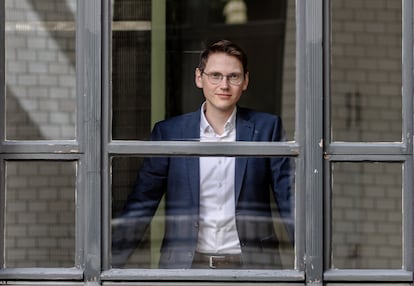Vincent August, sociologist: ‘Conflict can be highly productive for democratic societies’
The German researcher talks about social struggles in the face of change and the way in which different groups deal with the current climate issues

Vincent August studies the way in which a society’s dynamics change when conflict arises. He leads a newly created group at the Humboldt University of Berlin that investigates climate dilemmas, the way in which the groups that claim to represent the various agents involved in the climate emergency become established and the interactions that take place between them. In 2021, he published Technologisches Regieren: Der Aufstieg des Netzwerk-Denkens in der Krise der Moderne. Foucault, Luhmann und die Kybernetik [Technological governance: The rise of network thinking in the crisis of modernity. Foucault, Luhmann and Cybernetics], on how these two intellectuals elevated the concepts of flexibility and connectedness, and in 2019, in Der Transparenz-Imperativ [The transparency imperative], he warned about how the excess of government information ends up creating opacity.
August received EL PAÍS at his college, in a building next to the impressive headquarters of Berlin’s oldest university. His office, spacious and sober, has a very German air. He is the picture of restraint.
Question. What kind of reactions does the climate emergency cause in society?
Answer. At the international level, we have a problem with the implementation of climate agreements. The countries do not implement the agreed-upon points.
Q. And how do we react to this, shall we say, betrayal?
A. There is a wide range of climate activists, but political parties and unions are also pushing the issue. Groups like Fridays for Future organize mass protests, but they tend to deflate after a certain amount of time. It takes a lot of resources to mobilize a large group of people, and they usually have other things to do in their lives.
Q. How long do these protests usually last?
A. Waves of solidarity have an inherent tendency to decline. Sociologist Randall Collins analyzed the internal wave during 9/11 and observed that, after reaching its peak, it began to decline after two or three months. The period lasted a maximum of six months. After that, people stopped sharing flags and other rituals.
Q. What other strategies do the... let’s call them discontented, adopt?
A. Some organizations go for small, rather homogeneous groups that are far more mobile and committed. And other actors are trying to find new strategies with other actors, like unions. Unions are quite interesting actors in the ecological crisis because they come from classical modernity. They’re linked to coal miners and steelworkers [...] but at the same time they have an understanding of being a progressive force. Some of them are joining these alliances; others are reluctant, even obstructive.
Q. Who gets the political or legal representation of a given group, such as the future generations?
A. Fridays for Future has been quite successful in making those claims to represent the future generations. But at the same time, they compete with other groups that also support the reduction of emissions. In every country, voices are emerging that claim to represent some group or other. In Germany, [conservative politician] Ralph Brinkhaus, gave an interview and he more or less argued that someone has to represent the steak eaters of society. He tries to basically make a claim to represent a certain group, but that was not a group before he made the claim. We can see how the conflicts create new social groups by making representative claims.
Q. You talk about an ecological crisis within democracy. What do you mean by that?
A. The institutions of representative democracy are challenged by groups that work on ecological issues. So it starts with questioning, how are the political institutions able to respond at all to the ecological issues?
Q. Then, in the face of an emergency, do we lose faith in democracy?
A. The general public doesn’t have a good understanding of how a conflict works. The question is: are those conflicts going to be productive for democracies? Of course, they can also go in a different direction, be more destructive, but conflict can be highly productive for democratic societies.
Q. In Der Transparenz-Imperativ you write that when governments provide a lot of information they end up causing a lack of transparency. Can you explain?
A. Transparency creates more and more information, more and more documents. How are we able to sort that information? In an attempt to create transparency, governments create so much information that they become nontransparent. So what happens is that intermediaries step in, organizations that have the capacity, the manpower, the time, the skills to review all that information. NGOs, for instance. But in many cases, they are big companies. They can then use what they got from the mass of information to influence politics. So, in many cases you don’t get citizen participation, but expert participation.
Q. In your latest book, from 2021, you talk about how Foucault and Luhmann emphasized the importance of connectedness and flexibility in our society, and how we remain stuck in that idea.
A. They developed a series of arguments that changed the way we interpret our world and the way we govern. Since that new view arrived, the idea that computerization led us towards flexibility and connectedness, it is still with us. Companies, society, continue to be imbued with that interpretation. It’s not something evil; it’s how we look at ourselves. That thinking has shaped our everyday lives.
Sign up for our weekly newsletter to get more English-language news coverage from EL PAÍS USA Edition
Tu suscripción se está usando en otro dispositivo
¿Quieres añadir otro usuario a tu suscripción?
Si continúas leyendo en este dispositivo, no se podrá leer en el otro.
FlechaTu suscripción se está usando en otro dispositivo y solo puedes acceder a EL PAÍS desde un dispositivo a la vez.
Si quieres compartir tu cuenta, cambia tu suscripción a la modalidad Premium, así podrás añadir otro usuario. Cada uno accederá con su propia cuenta de email, lo que os permitirá personalizar vuestra experiencia en EL PAÍS.
¿Tienes una suscripción de empresa? Accede aquí para contratar más cuentas.
En el caso de no saber quién está usando tu cuenta, te recomendamos cambiar tu contraseña aquí.
Si decides continuar compartiendo tu cuenta, este mensaje se mostrará en tu dispositivo y en el de la otra persona que está usando tu cuenta de forma indefinida, afectando a tu experiencia de lectura. Puedes consultar aquí los términos y condiciones de la suscripción digital.









































